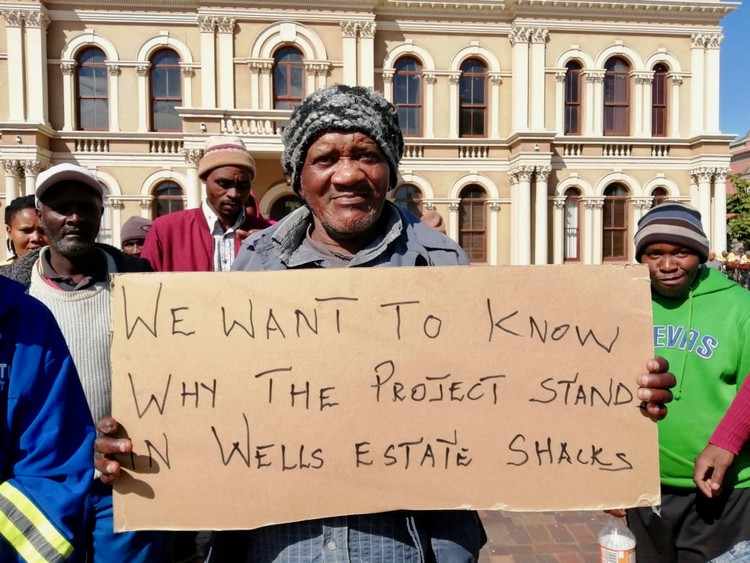Endlovini residents demand to know why electrification of their shacks stopped
About 50 people demonstrated outside Port Elizabeth city hall demanding electricity, toilets and water
About 50 land occupiers from Endlovini informal settlement in Wells Estate near Motherwell protested outside the Port Elizabeth city hall on Tuesday afternoon. They were demanding water, electricity and toilets.
The protesters blew vuvuzelas, sang and carried placards that read: “No empty promises” and “Why [did] the project stop”.
Khwezi Mfuniselwa, 70, carried a placard: “We want to know why the project stand [still] in Wells Estate shacks”. He said five years ago his grandchildren chased him out of his house in KwaZakhele. He and his wife put their social grants together and bought materials to build their shack in Endlovini.
“My health is very bad. I have arthritis, diabetes and high blood pressure … No one has threatened to evict us yet, but we want electricity, water and more toilets,” he said.
Backyard dwellers from ward 60 occupied the land in 2017. About 4,000 shacks now share 15 mobile toilets and one communal tap, which residents had installed, said resident Nolubabalo Dorho.
According to Dorho, a project to electrify the shacks, which started before Easter Weekend, came to a halt three weeks ago. “And no one came to explain,” she said. “We are only left with poles and cables in the area which is dark.”
Ward 60 Councillor Mvuzo Mbelekane (ANC) said, “We cannot cater for each and every resident even with taps, because of budget constraints … I am aware of a halt to electrification and am liaising with the project manager who is responsible for the whole metro regarding electrification of informal settlements.”
Support independent journalism
Donate using Payfast

Don't miss out on the latest news
We respect your privacy, and promise we won't spam you.
Next: Mdantsane community divided over suspended ward councillor
Previous: Parents shut dilapidated Tulbagh school
© 2019 GroundUp.
This article is licensed under a Creative Commons Attribution-NoDerivatives 4.0 International License.
You may republish this article, so long as you credit the authors and GroundUp, and do not change the text. Please include a link back to the original article.

